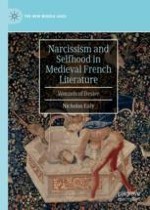2019 | OriginalPaper | Buchkapitel
7. Epilogue: Between Je me plaing and Iste ego sum
verfasst von : Nicholas Ealy
Erschienen in: Narcissism and Selfhood in Medieval French Literature
Aktivieren Sie unsere intelligente Suche, um passende Fachinhalte oder Patente zu finden.
Wählen Sie Textabschnitte aus um mit Künstlicher Intelligenz passenden Patente zu finden. powered by
Markieren Sie Textabschnitte, um KI-gestützt weitere passende Inhalte zu finden. powered by
